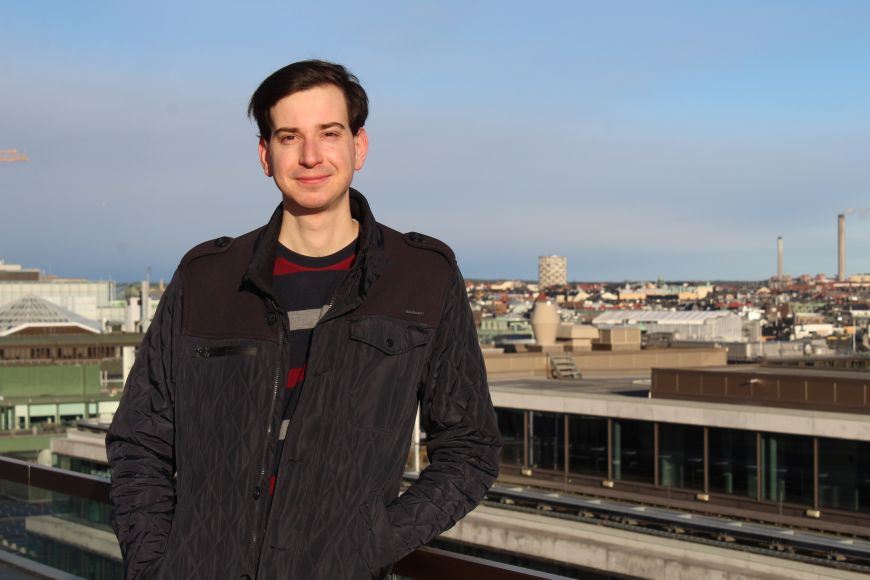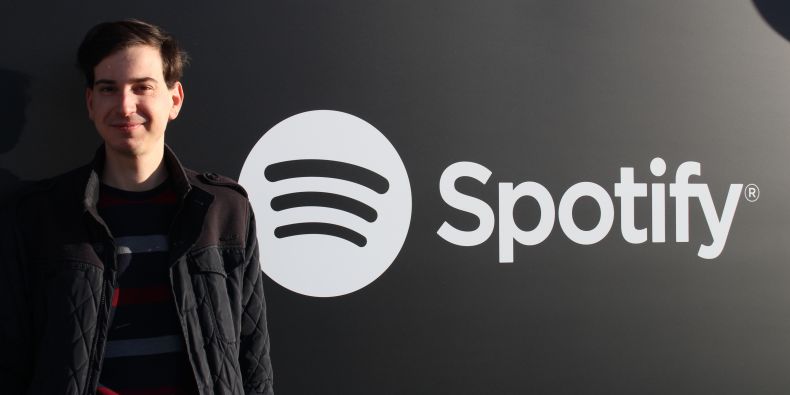Petr Zvoníček has been developing mobile applications already during his studies at Masaryk University, also thanks to a special course at the Faculty of Informatics. Ten years ago, mobile applications were nowhere as omnipresent as they are today. At the time, the Faculty was one of the first in the Czech Republic to open a mobile application development course.
Petr, together with three of his classmates, created a mobile application called iPumpuj which tracked petrol prices in the Czech Republic. The app has been one of the most downloaded Czech apps on the iOS platform ever since. The successful project led to the opportunity to work for Futured, a Brno-based mobile app developer. Three years later, he headed from that company straight to Spotify.
Getting a job at Spotify was probably not easy – how did you get it?
I had been thinking for a while about working abroad. Partly because I was excited about my Erasmus in Norway and I wanted to go somewhere like that again. I am also enthusiastic about music and I love going to concerts, so the idea of working for Spotify gradually took shape. I really liked the combination of music and Scandinavia, to be honest. I thought about it for maybe six months. One evening, I submitted an online job application and things began moving fast. In retrospect, the most challenging part was convincing myself to apply.
What was your job interview like?
I applied for the position of iOS mobile app developer. The interview process had four rounds in total and it was quite challenging. The first three rounds were conducted online. First, there were some technical interviews, which were actually the easy part for me. Then there was what they call a “values interview”, in which the managers were looking at how I worked, whether I was sufficiently independent, a team player and so on. This was challenging because there was no one right answer to their questions and it was hard to guess what they wanted to hear.
The last, fourth round, took place directly in Stockholm over two days, so I could see the offices and tour the city itself, which made quite an impression on me. All expenses were covered, including flight and accommodation, which was great. In Stockholm, I went through four one-hour interviews, each with a different person and on a different topic – technical things, a value interview again and a meeting where I was expected to present a project I had created myself. This was followed by an hour-long lunch break, where I met with three random Spotify employees who I could ask what it was like to work there. This was very helpful. Then I returned home and about two days later I got the call that I was hired, which was great. In the beginning, I didn’t really count on making it – not many people get invited to the first round. So I was all the happier about it.
You’ve been working at Spotify for over four years now. What exactly do you do over there?
My responsibilities are quite varied and interesting. For three years I worked in a team of eight people, where our job was to improve the mobile app and the environment for new users. We worked on different parts of the user experience, from improving the search engine to designing the app itself. My job involved a lot of programming, but there were also weeks where we didn’t code but prepared analyses as a team to determine what was worth our time to implement. So I got to try out other things like product development and experienced the complex decision-making processes that lead to finding the best idea that brings the most benefit to the product.
There was also a very interesting period when Spotify was entering the quite unique Indian market. In Europe, for example, it is common for users to search for music by artist. In India, on the other hand, people often search by the titles of Bollywood movies, which is a popular Indian film genre that includes a lot of music. Or they search by the name of an actor who lip-synced a certain song. So we had to create a technical solution specifically for India. And later we faced completely different challenges when we were entering other South Asian and South American markets, which was also a very interesting experience.
A year ago you moved to a different job. What are you working on now?
I wanted to learn something different so I moved to a completely different team, one which develops the backend to ensure the app runs smoothly and continues to grow. It was a big change and something completely new for me. But I’m really enjoying it. I’m creating something that helps my developer colleagues and makes their work easier – and I can really benefit from my experience having worked “on the other side” for three years. It helps me understand what my colleagues in the frontend need for their work. But it took a while for me to get the hang of it.
What’s it like working at Spotify?
I’m very happy there. It’s a fulfilling job, being able to help develop a product that half a billion people around the world use on regular basis. We’re one of the world’s biggest music streaming services and I’m really excited to see the impact our work is having on people. I also really like being part of the diverse international team in the company. Each day I get to meet people from different cultures and it is enriching for me. I also really appreciate how the company tries to grow and train its employees – we constantly have courses on hard skills and soft skills that push us further.
I also enjoy Stockholm, it’s a great place to live. It’s close to the great outdoors and there are hundreds of islands around the city so there’s always something to do there. And it is not that far from Czechia. A lot of my colleagues have to travel much further to home. It certainly wasn’t easy during the Covid pandemic when we had to work from home.
You mentioned that you like listening to music. How often do you use Spotify?
All the time, actually. I play music on Spotify every day at work. And when I’m not listening to Spotify, I’m playing vinyl records at home. I have over a hundred of them in Stockholm. Still, I really like Spotify. I’ve been using it for over ten years and it still hasn’t lost its magic for me. On the contrary – thanks to the work I’ve done to improve it, I can appreciate the service now more than ever and I love it.

